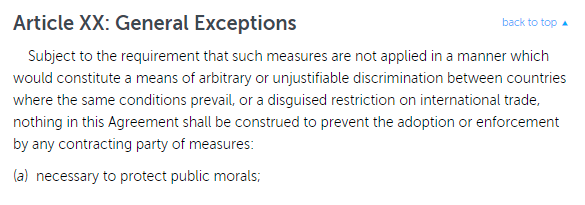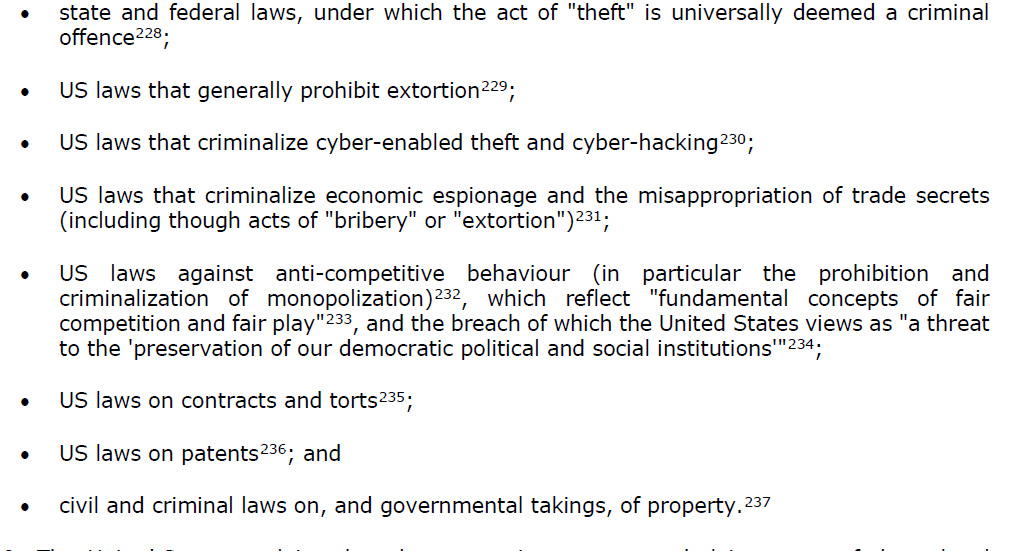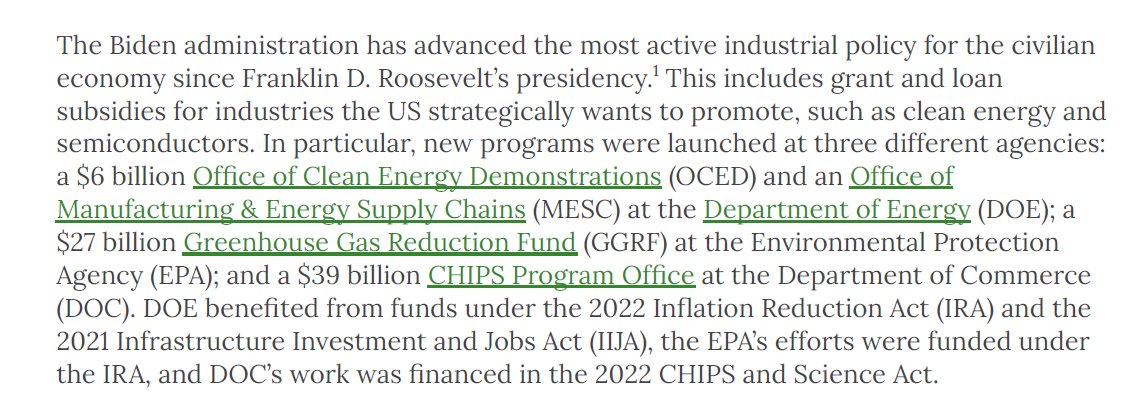The WTO just ruled against Trump’s China tariffs.
The case ended up hinging on a question that seems pretty unrelated to trade:
Does the totality of a country’s legal system say anything about its moral values? Thread
wto.org/english/news_e…
The case ended up hinging on a question that seems pretty unrelated to trade:
Does the totality of a country’s legal system say anything about its moral values? Thread
wto.org/english/news_e…
It was not unexpected that the WTO would find the levies in violation of the most-favored nation rules.
These are at the core of the global trading system, and ensure that the US generally gives every WTO member the same treatment.
The US did not even contest the point.
These are at the core of the global trading system, and ensure that the US generally gives every WTO member the same treatment.
The US did not even contest the point.
Rather, the US defense was that the MFN-violating trade actions were taken to further the cause of public morals – citing Article XX(a) of the GATT.
wto.org/english/docs_e…
wto.org/english/docs_e…

This was a creative defense, and probably the best one that the US could have made.
The argument is simple: the concentration and dependence of the US on a regime built in opposition to liberal values causes not only economic damage, but also erodes a sense of right and wrong.
The argument is simple: the concentration and dependence of the US on a regime built in opposition to liberal values causes not only economic damage, but also erodes a sense of right and wrong.

As evidence for what is considered “right”, the US referenced the entirety of the US federal and state legal code. On “wrong,” the evidence was the pervasive use in China of theft and market-countering industrial policy. 

Thus, the tariffs on China were important not only because of what they signal to trading partners, but what they signal to US citizens about what will and will not be tolerated. 

Leave to the side whether industrial policy in China or the US is actually wrong (it’s not – see below), Trump’s strategy is smart (it’s largely not), or whether US law and politics doesn’t display hypocrisy at times (it does).
rooseveltinstitute.org/publications/i…
rooseveltinstitute.org/publications/i…
It’s gutsy, and pretty mission creepy, for a trio of trade lawyers to tackle big philosophical questions like whether the entirety of a society and its laws say something about its values. But @scottjshapiro @Camila_Vergara @BLMcKean et al needn't worry about competition just yet
To China, any policy to protect public morals would need to be product-specific, like keeping out only specific imports deemed objectionable because of some inherent quality embodied in the item (e.g. gambling services, seal meat, etc.) 

The panel tended to agree: any policy aimed at protecting morals would need to be pretty targeted. Moreover, every pronouncement or request for comment would need to specifically mention the objective of protecting public morals. 

Granted, a lot of good government has been eroded away in the Trump era. But I don’t think it would be a net positive for society if policymakers had to explicitly say every time they were acting in what they saw as moral.
Indeed, the bigness of the policy action – high tariffs on hundreds of billions of trade – should be an indication that the administration sees the China relationship as pretty problematic from a values standpoint. 

The panel didn’t see it that way. Indeed, the fact that the US conducted a type of cost-benefit analysis before announcing the tariffs (and that it permitted affected importers to apply for exclusions) ended up being "proof" that the policy was “economic” as opposed to “moral.” 

This discussion is a bit of a tell: contemporary trade agreements increasingly contain provisions that further cost-benefit analysis and US-style regulatory review.
https://twitter.com/toddntucker/status/1225155008582356992
But if countries start using these techniques, they leave themselves open to critique that they’re acting “economically” rather than in support of other goals.
Indeed, the panel indicated that even considerations of public morals defenses had to be put in the context of the GATT’s preamble – which enshrines ongoing trade liberalization as the purpose of the agreement panelists are called upon to interpret. 

File this under the Subordination of Democracy to Market Logic, Exhibit 1,367. @zeithistoriker literally wrote the book on this.
hup.harvard.edu/catalog.php?is…
hup.harvard.edu/catalog.php?is…
The WTO report leaves it pretty evident that the body as currently constituted can’t be used by the US to counter China’s economic model. Even US allies took China’s side. @AmPhoenixTrade 

One upshot of the decision: it might force trade policymakers to speak more about the morality behind their policies. If they might ever want to avail themselves of the public morals defense, it could be prudent to do so.
A morally centered economics would be a net positive, and tracks what folks like @OmidyarNetwork @Hewlett_Found @AmerCompass @econliberties - and, humbly, @rooseveltinst - have called for.
Yet another odd consequence of Trump era disruptions. END
cnbc.com/2020/09/14/eba…
Yet another odd consequence of Trump era disruptions. END
cnbc.com/2020/09/14/eba…
Blogpost: Is USTR a Normative Actor? Are Laws Norms? Is Cost-Benefit Analysis Moral?
medium.com/@toddntucker/i…
medium.com/@toddntucker/i…
• • •
Missing some Tweet in this thread? You can try to
force a refresh












